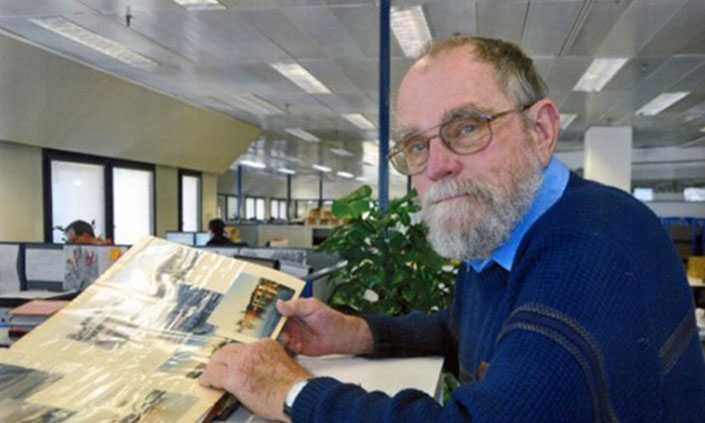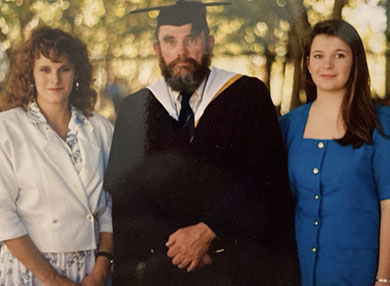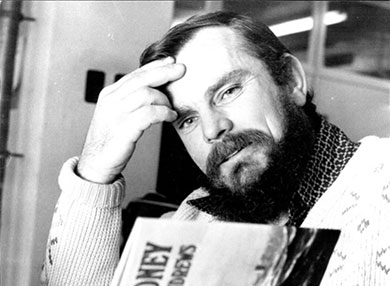The boy who loved ships
Neurodivergence can be challenging, but for Graeme Andrews OAM it was a superpower, fuelling his interest in maritime history that became his legacy.

Fascinated by the workings of a busy Sydney Harbour in the 1940s, Graeme Andrews spent his childhood playing on the waterfront in Mosman, catching ferries and counting the navy ships going back and forward. "He recognised them all, knew all the ferry skippers," says his daughter Gillian Andrews fondly. "They’d let him hang out in the wheelhouse because he was this cute little kid who just wanted to talk about boats."
It sounds idyllic – a time that could easily have been lost to history were it not for Mr Andrews's meticulous research – but it also gives an early insight into his boundless curiosity. As Gillian explains, “My dad had difficulty making friends his own age, but could chat for hours to the old guys on the wharf in Pyrmont about ships or the navy.”
It's easy to look back now and see the traits of a young neurodivergent individual, but back then, such intense focus was less understood, and people like Mr Andrews were often bullied. “Life can be hard when people don't understand the way you think,” she says.
But, for Mr Andrews, finding what he loved helped him survive the difficulties of being different – and set him on a career in the maritime industry from which he never wavered. “Dad left school at 15 and at 17, in 1955, joined the navy,” she explains. “It was tough, but the rules and regulations actually helped him, and the environment taught him the social skills he needed.”
He met his wife of 61 years, Winsome, at a church dance in Fremantle while serving in the navy, but left at 30 to settle into family life, raising Gillian and her sister Carina (now McSweeney) in Epping, not far from Macquarie University.
After some years editing boating magazines, Mr Andrews returned to his beloved waterways, first working as a Sydney Harbour and Manly ferry captain and then with the Maritime Services Board, skippering tug boats and pilot vessels. Later, as an instructor and examiner, he travelled throughout New South Wales, mentoring others to work on the water.
It was his writing, however, combined with his unrelenting research and extensive collection of photographs, for which he is most well known. “He achieved a productivity you couldn”t imagine while remaining totally committed to his family,” remembers Gillian, who inherited his work ethic, becoming the first in her family to complete high school and attain a university degree.
Drawn to Macquarie”s bush setting and the promise of independence a degree offered in the early 80s, Gillian says it was where she felt she could belong, setting in motion a chain of events that would lead other family members to study at Macquarie too, including her father.
“He applied for a Bachelor of Arts in the late 80s and probably thought, if she can do it, I can do it.” she laughs, but he was initially knocked back, which he felt was reasonable given he hadn't finished school. The story goes, however, that Macquarie phoned Mr Andrews and invited him for an in-person interview, and then, based on his prolific writing and research, offered him a place in the Master of Arts in History.
Winsome was especially supportive of her husband's entry to university, praising the effort and dedication he showed to study. “He would often drive for hours to attend a lecture after working at a coastal township, only to turn around and head back again that night,” she says. “The engaging tutorials broadened his outlook and had such a positive impact on him.”
Carina was a teenager when her dad was at uni, and recalls how motivated he was. “Dad had a home computer, which was impressive for the era, and encouraged me to use it to write and edit my essays the way he did. His time at Macquarie took him into new areas of study, and I was always inspired by his broad and deep knowledge on many different topics.”
With an almost superhuman focus, Gillian says Mr Andrews found his tribe. “The university environment was a safe space where Dad's intense interest in certain subjects was appreciated by his lecturers and colleagues. While he'd found his passion before his master's, he found his place at Macquarie and felt valued – it validated his knowledge and powered the second half of his career.”

A leading maritime historian, archivist and photographer, Mr Andrews's output was exceptional. He had more than 20 books published – including The Ferries of Sydney, Veteran Ships of Australia and New Zealand and The Watermen of Sydney: Memories of a Working Harbour – and over 1,000 articles. The Sydney Working Harbour photography collection – 10,000 images he digitised, identified and donated to the City of Sydney Archives – was a crowning achievement and one of the largest, most significant contributions of its kind, offering valuable insights into the harbour's history as a working port.
Recognised with an Order of Australia Medal, it was his drive to give back to society through his work that mattered to him most. “Dad had personal rules he lived by, and the most important was to contribute to the world,” remembers Gillian. “Always be useful, he would say.”
As Carina notes, “Dad made it clear to his daughters and his five grandchildren that learning and working hard were lifelong pursuits, and encouraged us to strive for knowledge, practical skills and expertise in what interested us most. His efforts to take on higher education in his fifties and unwavering dedication to heritage projects inspired us all to have the courage of our convictions.”
Two of Mr Andrews's grandchildren, Mitch and Ren, have now studied at Macquarie, making it three generations of this family to become alumni. “The fact my family has been part of Macquarie”s community and culture across generations has contributed to my sense of belonging,” says Mitch. “I've always known I'll achieve what I set out to here, just like my Mum (Gillian) and my Poppy before me.”
Mitch recalls, “I was the first to attend uni while being diagnosed with ADHD, so I faced less adversity and had access to assistance, such as the IEAP program. Macquarie has gone to great efforts to support me in the way my brain operates, and I'm grateful for that – it has allowed me to create and achieve things I can be proud of.”
With the thread of neurodiversity weaving through the family, Carina says she likes to think of herself as both an ally and an advocate. “With some family members across the generations either diagnosed or self-identifying as neurodivergent, along with our more neurotypical family members, each of us has strengths to be nurtured and, at times, some obstacles that challenge us.”
It's an insight that has informed Carina”s career in special education, and it was while undertaking her postgrad studies at Macquarie that more of the pieces started falling into place for the family. “It was already apparent that one of my children had some unique gifts and some challenges, and it dawned on me that my dad had quite similar traits.”
“He was a man of quite strong opinions but was also willing to consider and discuss differing ideas, including the realisation that he was on the autism spectrum,” says Carina. “It helped him understand himself better, and a few of the social challenges he'd faced.”
Mr Andrews spent his last thirty years on the Central Coast before passing away in 2024 at the age of 86. Sitting on the balcony with Winsome was a great pleasure for him later in life, watching the boats on the water and recalling many of his maritime adventures.
A man who will be remembered in big ways and small, Gillian says, “We're proud my father”s legacy and his love of Sydney Harbour will live on for future generations – in libraries, museums, public displays and maritime collections all around Australia.”

Graeme Andrews's bio
Graeme Andrews OAM earned a Master of Arts (History) (1999) from Macquarie University. A distinguished maritime historian, he authored around 20 books on Sydney's ferries, naval history and veteran ships, and contributed to Macquarie University publications. He was awarded the Australian Service Medal for his naval service during the Malaysian conflict, and is widely respected for his contributions to maritime history and heritage.
Gillian Andrews graduated from Macquarie University with a Bachelor of Economics and a Postgraduate Certificate in Higher Education. She also holds an MBA from UTS and an MSc from EBS. She was an adjunct lecturer at Macquarie University for many years and is currently a leadership development coach and advisor.
Carina McSweeney holds a Bachelor of Education (Primary) (2003) and a Postgraduate Certificate in Special Education (2014) from Macquarie University. With over 20 years of teaching experience, including a decade as a specialist learning support teacher and coordinator, Carina is passionate about improving literacy. She now delivers professional development with SPELD NSW, a not-for-profit organisation supporting people with learning difficulties.
Ren McSweeney graduated with a Bachelor of Arts (2022) with majors in Japanese Studies, Interactivity and Games. Despite the social and academic challenges of studying during COVID lockdowns, Ren created some lasting connections with like-minded students, enjoyed a study exchange and travels in Japan, and works hard to contribute to community-focused organisations.
Mitchell Dunstan is in his final year at Macquarie University studying a Bachelor of Information Technology with a major in Software Technology and a full-time project in innovative game design, Depths of Dourheart, which he plans to release soon. Throughout his degree, Mitch has explored a diverse range of units from creative writing to psychology, finding connections between his academic pursuits and his interest in game design.